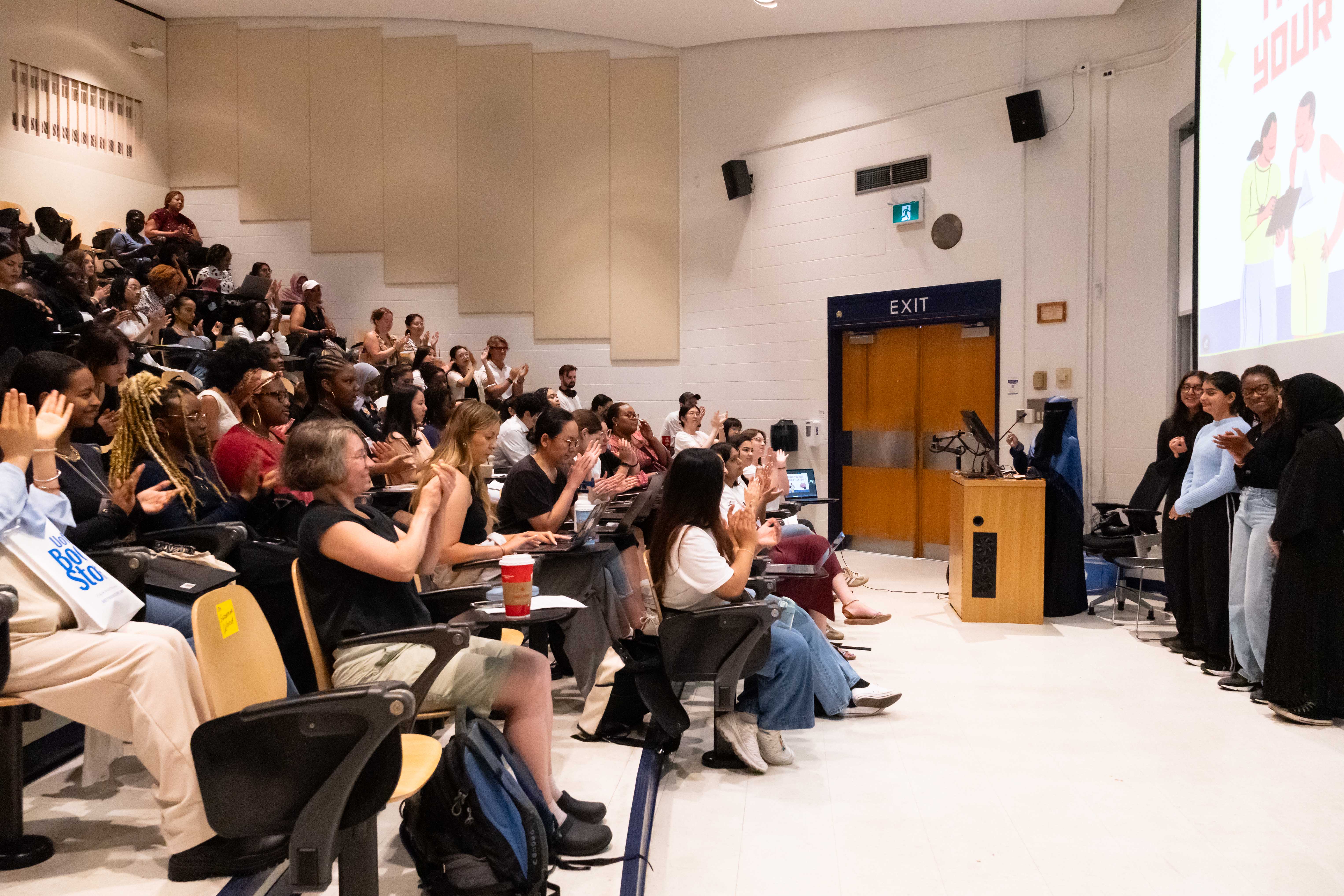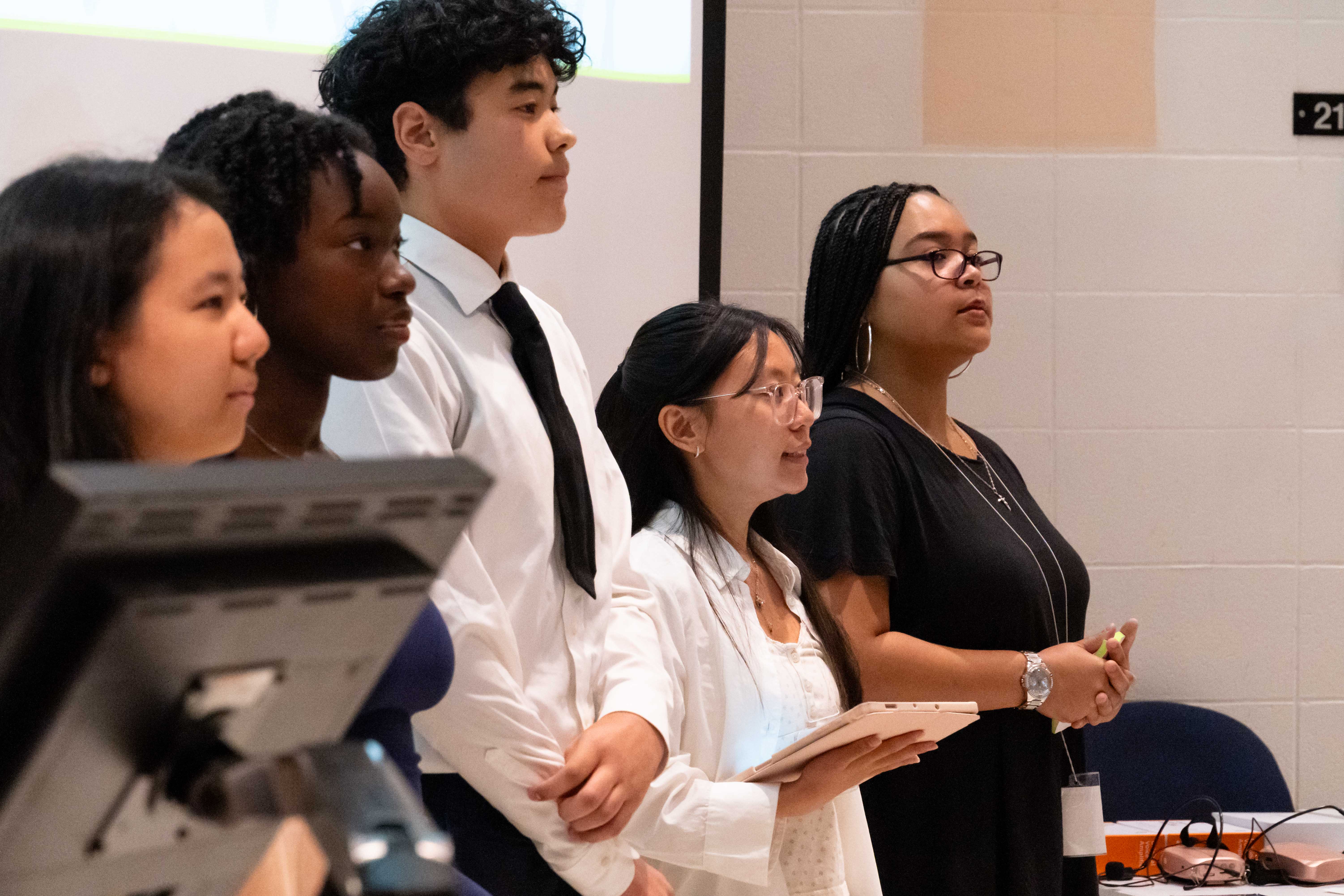The Summer Psychology Research Initiative (SPRINT)—an outreach and access program established five years ago by graduate students in the Department of Psychology—celebrated its biggest year yet this summer at the University of Toronto.
Out of a record 662 applications from students at 178 different high schools in Ontario, 60 students were invited to participate in the free two-week program designed to advance equity, diversity, inclusivity, and accessibility in psychology and post-secondary education.
“The students are coming in relatively fresh; they don’t yet have a really good sense of what psychology research is,” says Bryan Hong, a Postdoctoral Fellow in the Department of Psychology and one of SPRINT’s founders.
“But by the end of the program they’re putting together these outstanding and nuanced research proposals, talking about topics like neuroimaging and longitudinal studies. It’s really cool to see.”

Led by a group of graduate students and postdoctoral researchers, SPRINT has been providing research and learning opportunities to underrepresented students since 2020, particularly Indigenous, Black, and racialized students. It also invites participants to connect with mentors at U of T and other high school students around the province who are interested in psychology. In 2024, the program started prioritizing applicants from other underrepresented groups as well, including those who identify as a gender minority or a first-generation university student.
“Being a racialized person in academia, you can really see the underrepresentation of people that look like you, especially as you go to higher levels,” says Hong.
“There are so many systemic barriers that can impede someone’s ability to pursue an academic research career. Creating these opportunities to help reduce those in some way has been super meaningful to me.”
As volunteers with the program, U of T students and trainees have been able to build their own skills as well.
“SPRINT gives you opportunities you don’t really get outside of it,” says Tayler Wells, a PhD student in the Department of Psychology and a member of the SPRINT Executive Team. Earlier this year, for instance, volunteers participated in a series of workshops led by U of T faculty to build essential teaching, mentoring, and communication skills.
The Department of Psychology at U of T St. George and the Tri-Campus Graduate Psychology Program have provided SPRINT with financial and administrative support since its start. With this help, SPRINT provides honorariums to volunteers, can secure space on campus, and produces necessary materials for participants. This year, the Department of Psychology at U of T Mississauga pledged additional funding to the program.
With new funding from the Access Strategy & Partnerships Office at U of T, SPRINT was also able to provide financial support for eight undergraduate students to take part in the workshop series, help plan program logistics, and serve as mentors.
Ready, set...Go!

SPRINT 2025 kicked off with an alumni panel and social featuring past participants who now study psychology at universities across Ontario or who have recently graduated. They spoke about how SPRINT gave them a head start in their post-secondary studies, helped them land research opportunities as undergraduates, and led to meaningful connections with fellow participants and mentors.
Throughout the first week of the program, SPRINT participants attended lectures and panel discussions to learn about a range of psychology topics including social, cognitive, and developmental psychology. They also learned about applying to university, what it’s like to be an undergrad, and transitioning to post-secondary education. The following week, they grew their research and writing skills in morning tutorials and spent their afternoons developing research proposals in small groups under the mentorship of U of T students and postdoctoral researchers.

On the final day of SPRINT, eight groups took the floor at Sidney Smith Hall to present original and engaging research proposals to fellow students, faculty, and loved ones.
They explored topics at the heart of psychology, including how personality and culture influence social anxiety in adolescents, the effects of childhood trauma and exercise on working memory, and the impacts of active learning on belonging and academic success in high school students.
A panel of judges made up of postdoctoral researchers and graduate students evaluated presentations based on clarity, novelty, and considerations of equity, diversity, and inclusivity.

The winning proposal by Negan Nur Mohamed, Augustine Smith, Alahna Branch, Mya Harding, and Honour Short put forward a plan to explore the link between disorganized attachment and psychosis severity.
“Watching all their proposals and learning about what they’ve put together in such a short amount of time was not only so impressive, but also so interesting,” said Wells.
A team effort
This year, SPRINT was supported by 50 volunteers, including undergraduate and graduate students, faculty, staff, librarians, and U of T community members. With new funding from the Access Strategy & Partnerships Office, SPRINT was able to provide financial support for eight undergraduate students to take part in the workshop series, help plan program logistics, and serve as mentors.
SPRINT organizers also work with community partners and divisions across U of T to help find potential participants who may not otherwise be reached by universities.
While SPRINT’s capacity is limited, they provide lecture materials to all applicants.
“We try to make sure we can give as much as we can to as many students as possible,” said Wells.
The next lap
There’s significant interest in the program among those who teach psychology.
This October, Alexa Sacchi will be presenting on behalf of the SPRINT Executive team at the Society for Teaching Psychology’ Annual Conference of Teaching in Minneapolis. Organizers are keen to share what they have learned and developed since establishing SPRINT with other institutions that are interested in creating similar programs for their communities.
They are also exploring ways to expand SPRINT to U of T’s other campuses to help cut down commute time for participants outside of Toronto’s core.
Connect with SPRINT
You can learn more about SPRINT by visiting their website and following them on Instagram.
Applications for SPRINT 2026 will open in the Spring.
U of T community members who are interested in supporting the program can subscribe to their newsletter.


